Stay in the know on all smart updates of your favorite topics.
Demoday #28: How to keep our mechanics on the move?
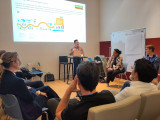
On the 5th of July, during Demoday #28, we zoomed in on one of the pressing challenges facing the energy transition: grid congestion, and more specifically, how to keep the people who maintain the grid moving efficiently.
Grid congestion is a serious and growing concern for grid operator Alliander. It is therefore essential to speed up the grid reinforcement as much as possible. Alliander’s Operation 2.0 team is exploring innovative ways to work smarter, faster, and more flexibly to keep pace with these developments.
Their efforts focus on three tracks:
• Alleviating staff shortages by training office employees to occasionally support fieldwork.
• Exploring technologies like advanced ground radar to get better insights into underground assets.
• Improving the logistics of supplying mechanics to ensure they have the right tools, in the right place, at the right time.
This last track was the main focus of our work session.
Inefficient supply of mechanics
Logistics experiences show that mechanics collect materials inefficiently when supplying their vans and jobs, resulting in stock corrections, less control over stock, unnecessary work for logistics staff, and valuable mechanic hours being lost, which leads to less execution work. A few key problems stood out:
• Supplies are scanned inconsistently, so the system doesn’t reflect what is actually in stock.
• Every van is different, with a custom layout that suits the preferences of its mechanic.
• The work itself is unpredictable, which makes standardised restocking difficult.
• With a transition to smaller electric vans, space is becoming even more limited.
A simple optimisation of the process is not enough, especially without considering the human element. For many mechanics, a visit to the supply centre is more than just logistics. It is a moment of connection, a short break from the road, or simply a chance for a good coffee.
Ideas from the network
In groups of four, we brainstormed creative ideas to improve the supply of Alliander vans while keeping the needs and routines of mechanics in mind.
Some highlights:
• Peer-to-peer van inspiration: Let mechanics share the layout of their vans with colleagues. They can exchange best practices and take pride in an efficient setup. Adding a bit of gamification might boost motivation even more.
• A mobile supply service: A supply van could drive around to restock mechanic vans, reducing the need to visit the supply centre. However, this might remove the social element of taking a break with colleagues.
• Smarter routing: Track the location of mechanics only in relation to nearby grid faults. This way, the closest available mechanic can respond without feeling like their movements are constantly being monitored.
• Package-based resupply: Inspired by delivery service Picnic, mechanics could exchange complete “supply packages” instead of picking out materials individually. Collaborating with wholesale suppliers could reveal more useful insights.
• Automatic stock tracking: Tag all materials with RFID chips and use sensors installed in the door of the van to register what is removed from the van. This eliminates the need for manual scanning and reduces the chance of mistakes.
Do you have a bright idea to improve how mechanics work? Let us know in the comments or send a message to Noor at noor@amsterdaminchange.com.
A big thank you to Thomas Hoekstra and Iris van der Zanden from Alliander for bringing this challenge to the network, and to Chantal Inia from Royal HaskoningDHV for moderating the session.
🚨 𝗪𝗲'𝗿𝗲 𝗮𝗹𝗿𝗲𝗮𝗱𝘆 𝗮𝘁 𝟱𝟬% – 𝗮𝗻𝗱 𝘄𝗲 𝗵𝗮𝘃𝗲𝗻'𝘁 𝗲𝘃𝗲𝗻 𝗸𝗶𝗰𝗸𝗲𝗱 𝗼𝗳𝗳 𝘆𝗲𝘁! 🚨
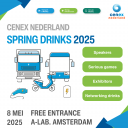
Wow! Half of the tickets for our Cenex Nederland Lenteborrel have already been ordered – and the event isn’t even happening until 8th of May 2025. 🎉
That means: lots of excitement, high expectations, and... an opportunity you don’t want to miss.
The event will be focusing on Transport & Mobility, Circular Mobility, Energy & Infrastructure, where you can expect the following.
📍 What to expect:
✅ Meet exhibitors and explore the latest innovations
🎮 Join or watch two exciting serious game sessions
🎤 Be inspired by four engaging keynotes (English)
🥂 End the day with our annual spring reception where you have the opportunity to network.
Want to join us? Don’t wait too long – the remaining 50% is likely to go even faster. 🎫
Please make sure to get your (free) ticket via Eventbrite
Demoday #27: Zero Emission City Logistics - The Food Center Amsterdam Case. Hosted by the Interdisciplinary Graduation Circle (HvA)
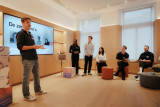
Amsterdam faces a major logistics challenge: from January 2025 onwards, polluting delivery vans will no longer be allowed in the city centre. How can entrepreneurs and suppliers in the food sector prepare for this and turn the transition into a success? Four fourth-year students from the Amsterdam University of Applied Sciences (HvA) are working together in an interdisciplinary graduation circle to find solutions. They are addressing both the technical aspects of this issue and the communication side. Drawing on their different fields of study, they analyse the problem and develop a joint recommendation for the Amsterdam Transport Region (Vervoerregio Amsterdam). As part of their research, they used this working session as a focus group with stakeholders from the Amsterdam InChange network.
Opening of the session
Stan van der Meer (Logistics Management), Chanel Pinas (Digital Marketing), Jay van den Boog (Digital Marketing), and Vanessa Man (Logistics Engineering) opened the session with a few questions to get a sense of the participants in the room. The attendees rated their own level of expertise on the topic and wrote down a word they associated with the issue.
The room was filled with expertise: policymakers from the Municipality of Amsterdam directly involved in the issue, as well as researchers and advisors from Arcadis and Cenex who are actively working on zero-emission logistics. Representatives from the Port of Amsterdam and EIT Urban Mobility (a European network) were also present, each bringing their own perspective on the challenge.
Statements and discussion
The students facilitated the discussion by presenting a number of statements, and moderating the group discussions that followed. Below are a few observations.
Statements 1 and 2 (summarized): Amsterdam entrepreneurs are aware of the new zero-emission policy, and it is clearly presented to them.
There was broad consensus within the group regarding the city’s policy. Communication from the Municipality of Amsterdam has been extensive over the past ten years — first targeting larger logistics partners in the city, and more recently also via letters to local entrepreneurs. In addition, physical signs throughout the city communicate the new regulations. However, what can cause confusion among entrepreneurs are the mixed signals coming from national politics and policies. This can create the impression that there is a lack of determination or vision behind the transition, making entrepreneurs hesitant to invest in new electric vehicles.
Statement 3: There is sufficient support for entrepreneurs to switch to zero-emission transport.
The group also agreed that the municipality is doing a good job offering financial support where needed. Advisors, for example, are available to guide entrepreneurs through the rules and support options. However, it was noted that the target audience still does not always have a clear overview of all the possibilities. While the municipality communicates well and “presents” the available opportunities, confusion and uncertainty remain among entrepreneurs on the streets. This represents an important communication challenge that the students will further explore.
Also, regarding this statement and the ones before, it was noted that the (micro)entrepreneurs and stakeholders we were talking about weren't present in the room. It would have been good to have more of the target group in the room, but for this session specifically the policymakers and specialists from our network were the ones the students focussed on. In the following months of their research, their focus will be on the specialists and (micro)entrepreneurs in the food sector.
Statement 4: Logistics hubs play an important role in reducing transport movements in the city.
This part of the discussion became more technical. The group agreed that a new logistics system with greater use of hubs throughout the city is, in theory, a logical and effective step in this transition. In practice, however, it is not as simple as it sounds. For example, consider the Port of Amsterdam — an existing large hub at the edge of the city for water-based transport. While goods can be transferred there to smaller vehicles for distribution within the city, docking on the busy canals poses a significant challenge. Additionally, water transport was the first sector required to become fully electric, and this system is currently somewhat reduced in scale
Road transport is also complex. Hubs are locations where goods from different suppliers can be combined and delivered with fewer transport movements. But who holds responsibility for these goods if something goes wrong? And how can this be managed without adding too much delivery time?
One of the participants summarized it well: we are shifting from logistics as a chain, where each party is responsible for a small part, to an ecosystem where all actors and the physical infrastructure depend on one another, share collective responsibility, and need to exchange information and services to keep the system running.
In-depth interviews
The second part of the session consisted of two breakout groups in which the students could ask targeted questions for the research they are conducting. Jay and Chanel spoke with several participants about the research side of the project, delving deeper into successful research methods that involve entrepreneurs. Stan and Vanessa spoke with another group of participants about potential solutions for this issue, gathering knowledge about existing innovations and solutions or what might still be needed for this logistical transition.
Follow-up
Through this focus group, the students in this interdisciplinary graduation circle have engaged in dialogue with experts on this topic from various organizations. They also made many new contacts and actively shared their project with the network. During our upcoming Knowledge and Demo Day on June 5, they will once again be part of the program and present their results and potential conclusions.
Would you like to know more about the graduation circle, the research topic, or do you have tips or questions for the students? Feel free to reach out via pelle@amsterdaminchange.com
Demoday #25: Scenarios for Smart Mobility in the Province of North Holland 2050
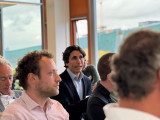
During our Knowledge and Demo Day on 10 October (2024), Guus Kruijssen and Rombout Huisman (Province of North Holland) led a working session on their recent scenario studies – Smart Mobility North Holland 2050. In this report, I will share the four ‘Context’ scenarios they developed, the process, and the discussions with the session participants.
Objectives of the Scenario Study
What do we actually mean by future visions and scenarios? What are the different types, and how can they be used? A discussion among the participants quickly highlighted the many different motivations, forms, and use cases. Rombout and Guus began by explaining their aim for this study.
The province of North Holland plays various roles in the field of mobility as a policymaker, road manager, and concession provider. Given the major challenges related to housing, CO2 emissions reduction, and road safety, their perspective on the future of mobility revolves around Reducing (travel), Improving (travel options), and Changing (travel behaviour). This perspective forms the basis for developing, operationalising, and maintaining their strategy – a cycle that spans approximately 50 years. However, digital developments and innovations are making the world change faster than ever, necessitating greater awareness of possible contextual changes. The key question is: how do the choices we make now relate to the different possible futures?
To explore this, a team of colleagues embarked on developing four challenging context scenarios. Working with internal and external experts, they moved from an environmental analysis and contextual factors to scenarios and strategic insights. The process and outcomes were kept administrative and had no political or policy-driven focus. The result is not a set of visions to choose from but rather a representation of various developments and challenges that may arise, to which you can assess your own projects and actions against.
The Four Scenarios
Four distinct context scenarios were developed. Here is a summary and a few key aspects of each:
- Steady Traffic (Doorgaand verkeer) A slow shift towards a green economy, benefiting only the Amsterdam Metropolitan Area (MRA). The population grows to 3.7 million. Cars remain dominant, transitioning gradually to electric, but roads and trains stay congested. Digitalisation and innovation progress slowly, with limited impact on efficiency and accessibility.
- Turbulent Weather (Rukwinden) Ongoing shocks and international instability, with the US leaving NATO and significant climate change. The population increases to 3.1 million. Fuel crises accelerate electrification, but investment focuses on priorities like the navy. Technological scepticism grows due to data breaches, impacting accessibility.
- Our Own Path (Eigen weg) The Netherlands withdraws from international cooperation and leaves the EU, focusing on healthcare, circularity, and local production. The economy contracts due to trade restrictions and brain drain, and the population decreases to 2.6 million. Fewer traffic jams, but cars remain significant alongside increased regional public transport. Distrust in innovations and sustainability rises, with informal sharing preferred over commercial options.
- Transition (Overstappen) Climate change accelerates transition and AI development. The population stabilises at 3.1 million. Non-sustainable sectors disappear, and reduced traffic results from digitalisation and virtualisation. Space is primarily used for energy infrastructure, and circular processes increase. The EU and the national government push for innovations like autonomous transport and shared mobility. Ownership is limited to the wealthiest, and digital infrastructure becomes a priority.
Outcomes and Follow-Up
Rombout and Guus guided the group through the process and results of these scenario studies. We discussed the developments and contextual factors used in the study, and considered if anything was missing. They openly shared their approach and how they plan to use these insights to assess their own policies and projects, and welcomed questions and suggestions from the group. There was also room for discussing the challenges. Because, while people can easily align on scenarios, opinions can still vary greatly on how we should act on them now.
Many of our partners are already working with future visions and scenarios. See, for instance, our report on a session with trendwatchers from the Municipality of Amsterdam. The purpose, process, and impact on policy, projects, and actions vary across organisations. However, there was agreement that sharing methods and scenarios is valued, particularly in a neutral setting like our innovation network. It fosters mutual understanding and offers valuable lessons from each other's research methods and practical applications. In the coming period, we will explore how we can contribute to this in our network on various transition themes.
Would you like to know more about this study from the Province of North Holland? Feel free to send me a message, and I will connect you. Interested in brainstorming about how we can approach this more frequently or systematically within the network? Let me know at pelle@amsterdaminchange.com.
Deelscooteraanbieder Check introduceert een veiligheidsslot
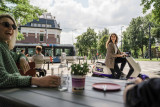
Deelscooteraanbieder Check introduceert vandaag een veiligheidsslot in haar app: de Safety Lock. De Safety Lock is ontworpen in afstemming met jongerenorganisatie TeamAlert. Met het slot kunnen gebruikers de eigen Check app tijdelijk blokkeren voor het reserveren van voertuigen. Op deze manier beschermt de gebruiker zichzelf tegen het (laagdrempelig) gebruik maken van scooters op een later tijdstip. Naast de Safety Lock introduceert Check ook een gerichte communicatiecampagne om gebruikers op relevante momenten te wijzen op de gevolgen van rijden onder invloed.
TeamAlert: ‘Actie nodig om dronken jongeren van deelscooter te houden’
In februari 2023 publiceerde TeamAlert, een organisatie die zich inzet voor de verkeersveiligheid van jongeren, een enquête waaruit blijkt dat ruim een kwart van de jonge deelscootergebruikers met een leeftijd tot en met 24 jaar wel eens onder invloed op een deelscooter stapt en de risico’s daarvan onderschat. De enquête was onder bijna duizend jongeren afgenomen. Naar aanleiding van het onderzoek riep TeamAlert gemeenten en deelscooteraanbieders op om in actie te komen en na te denken over oplossingen.
Deelscooteraanbieder Check introduceert de Safety Lock
Het onderzoek van TeamAlert, in combinatie met een landelijke toename van het gebruik van alcohol en drugs in het verkeer in 2022 (37,4% meer uitgedeelde boetes), is aanleiding geweest voor deelscooteraanbieder Check om in actie te komen. Op basis van meerdere gesprekken en feedbacksessies met deelscootergebruikers en verschillende autoriteiten op het gebied van verkeersveiligheid, waaronder TeamAlert, introduceert Check vandaag de Safety Lock. Met het slot kan elke gebruiker de eigen Check app tijdelijk blokkeren voor het reserveren van voertuigen. Op deze manier beschermt de gebruiker zichzelf tegen het (laagdrempelig) gebruik maken van scooters op een later tijdstip. Mochten gebruikers het slot toch willen deactiveren, omdat ze bijvoorbeeld niet onder invloed zijn, dan moeten ze eerst verplicht één minuut lang een tutorial over de gevolgen van rijden onder invloed bekijken. Gebruikers die het slot activeren worden gestimuleerd om hun Safety Lock te delen met vrienden om uit te dragen dat onder invloed zijn en rijden, niet samen gaat.
De Safety Lock helpt de gebruiker bij het maken van de juiste keuze
Saar Hadders, gedragsonderzoeker bij TeamAlert, legt uit hoe de Safety Lock gebruikers in staat stelt om de juiste keuzes te maken: “Onder sommige gebruikers geldt een sociale norm dat het rijden onder invloed op een deelscooter normaal is. Door het bedenken van een nieuwe feature om rijden onder invloed op deelscooters tegen te gaan, zendt Check een krachtige boodschap uit dat dit gedrag niet oké is. In de omgeving van jongeren zijn vrienden erg belangrijk in het creëren van een veilige sociale norm. Doordat de Safety Lock gebruikers stimuleert om de feature met hun vrienden te delen, wordt deze sociale norm versterkt.”
Hadders: “Jongeren hebben niet altijd de intentie om na een avondje stappen onder invloed te gaan rijden, maar door een combinatie van impulsiviteit en het effect van alcohol kan deze intentie vervagen. De Safety Lock biedt jongeren de mogelijkheid om zichzelf vóórdat ze hun eerste drankje drinken, te behoeden voor een onveilige rit naar huis. Wanneer gebruikers in de loop van de avond tóch van gedachten veranderen, deelt Check kennis over waarom het goed is om nuchter te rijden. Deze kennis kan helpen om alsnog het veilige gedrag te vertonen en ander vervoer te kiezen.”
De Safety Lock wordt versterkt door gerichte en relevante communicatie
Check heeft de communicatie om rijden onder invloed tegen te gaan opgedeeld in drie tijdvakken. De tijdvakken zijn gebaseerd op onderzoek van het SWOV. Afhankelijk van het tijdvak worden gebruikers aangemoedigd tot verantwoordelijk gedrag in het verkeer, bijvoorbeeld door gebruikers voorafgaand aan een avondje uit te attenderen op de mogelijkheid om het Safety Lock te activeren. Gebruikers die vrijdag- of zaterdagnacht tussen 23.00 uur en 06.00 uur een deelscooter willen pakken moeten eerst verplicht een tutorial kijken over de gevolgen van rijden onder invloed.
The impact of the availability of 'self-driving' cars on travel behavior 2/8
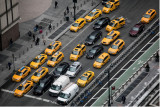
If autonomous cars can transport us affordably, do we no longer want to own our own car? Are we switching en masse from public transport, do we leave our bikes unused, or do we walk less? Do we drive alone, or do we share the car with other passengers? Will autonomous cars share he road with other traffic, including cycling? Are we going to use a car more often and longer and how many cars drive empty waiting for a customer?
Of course, no scientific study can answer all these questions yet. Nevertheless, research offers some insight.
Ride-hailing
First, what do we know about the influence of ride-hailing? That is calling a taxi from Uber or Lyft and a handful of other companies with an app. Juniper Research expects that the use of this service, which already has a global turnover of $ 147 billion, will increase fivefold in the coming five years, regardless of whether the taxis involved are 'self -driving' or not. Clear is that most users seem not to appreciate the presence of fellow passengers: the number of travelers that share journeys is only 13%.
Research in seven major American cities shows that 49 to 61 percent of all Uber and Lyft-taxi rides would have been made by walking, cycling, taking public transport or not at all. These journeys only replace car use to a limited extent. As a result, the number of train passengers has already fallen by 1.3% per year and that by bus by 1.7%. At the same time, congestion has increased.
A publication in the Journal Transport policy showed that travelers travel twice as many kilometers in every American region that they would have done if Uber and Lyft did not exist. It also turned out that taxis drive empty 50% of the time while they are waiting for or on their way to a new customer. Another study found that many Uber and Lyft customers who once used public transport buy a car for themselves.
The effect of 'self -driving' cars
The number of studies after the (possible) effect of the arrival of 'self -driving' cars is increasing rapidly. Research by the Boston Consultancy Group showed that 30% of all journeys will take place in a 'self -driving' car as soon as they are available. A considerable number of former public transport users says they will change. Despite the price advantage, the respondents will make little use of the option to share a car with other passengers, but it is known that attitudes and related behavior often differ. Nevertheless, this data has been used to calculate that there will be more cars on the road in large parts of the cities, resulting in more traffic jams.
Semi-experimental research also showed that the ability to travel with a 'self-driving' car results in an increase in the number of kilometers covered by around 60%. Unless autonomous cars drive electrically, this will also have significant negative consequences for the environment.
The Robottaxis in suburbs had a different effect: here travelers would leave their car at home more often and use the taxi to be transported to a station.
See robot taxis and public transport in combination
Despite all the reservations that must be made with this type of research, all results indicate a significant increase in the use of taxis, which will be at the expense of public transport and will result in more traffic jams in urbanized areas. This growth can be reversed by making shared transport more attractive. Especially on the routes to and from train, metro, and bus stations. Only in that case, will there be an ideal transport model for the future: large-scale and fast public transport on the main roads and small-scale public transport for the last kilometers and in rural areas.
In a couple of days my new ebook will be available. It is a collection of the 25 recommendations for better streets, neighbourhoods and city's that have been published at this spot during the last months
AMS Conference 2024: Call for abstracts and special sessions

We invite you to contribute to the conference "Reinventing the City 2024 - Blueprints for messy cities?"
Deadline to submissions: November 14, 2023
Notification of acceptance: December 14, 2023
submit here>>
The AMS Scientific Conference (AMS Conference) explores and discusses how cities can transform themselves to become more livable, resilient and sustainable while offering economic stability. In the second edition of “Reinventing the City” (23-25 April 2024), the overarching theme will be <em>"</em>Blueprints for messy cities? Navigating the interplay of order and complexity'. In three captivating days, we will explore 'The good, the bad, and the ugly' (day 1), 'Amazing discoveries' (day 2) and 'We are the city' (day 3).
Call for abstracts
The AMS Conference seeks to engage scientists, policymakers, students, industry partners, and everyone working with and on cities from different backgrounds and areas of expertise. We therefore invite you to submit your scientific paper abstract, idea for a workshop or special session with us. Submissions should be dedicated to exploring the theme ‘Blueprints for messy cities?’. We especially invite young, urban rebels to raise their voice, as they are the inhabitants of our future cities.
Assessment
Our scientific committee responsible for the content of the conference program will assess all submissions and select a final program of contributions. Notification of acceptance will follow before 1 December 2023.
Topics
mobility | circularity | energy transition | climate adaptation | urban food systems | digitization | diversity | inclusion | living labs | transdisciplinary research
SUBMISSIONS AND CONTRIBUTIONS
| SCIENTIFIC PAPER ABSTRACTS |
We invite academics, industry partners, and professionals from all ages engaged in the related fields of urban design, governance, architecture, data science, engineering and/or sociology to submit an abstract for a conference presentation of your scientific paper (250-450 words).
| WORKSHOPS |
If you have a workshop proposal, please outline its purpose, the specific knowledge, techniques, or practices it covers, its objectives and learning outcomes, teaching strategies and resources, target audience, and any prerequisites, including the required level of experience (250-450 words).
| SPECIAL SESSIONS |
Next to scientific papers and workshops, we encourage you to submit different types of special sessions. These special sessions can include interactive forums, excursions, or practical demonstrations, depending on the subject and objectives. When submitting your proposal for a special session, we ask you to clearly highlight the session's objectives, expected collaborators (if applicable), the intended audience, and the type of session. Please also indicate whether you prefer an online or in-person format. Please note that you will be responsible for the content and organization of the session (250-450 words).
Click here to visit the event page and find more information on details about the Scientific Conference.
Check straft foutparkeerders deelscooter af met blokkade account
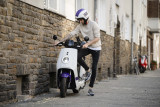
Om overlast van foutgeparkeerde deelscooters in de openbare ruimte te verminderen, introduceert deelvervoeraanbieder Check vandaag de Parkeerscore. Dit is een nieuwe functionaliteit in de app, waarmee gebruikers van deelscooters inzicht krijgen en afgerekend worden op hun parkeergedrag.
De parkeerscore
De Parkeerscore wordt getoond in de app van alle gebruikers. Voorafgaand aan een rit op een deelscooter van Check, beoordeelt een gebruiker hoe de scooter geparkeerd staat: duimpje omhoog of duimpje omlaag. Deze beoordeling wordt toegevoegd aan het profiel van de vorige gebruiker van de desbetreffende scooter. Alle beoordelingen over een gebruiker samen vormen de individuele Parkeerscore.
Op basis van de score krijgt een gebruiker de classificatie Uitstekend, Kan beter of Niet goed. Met de classificatie Kan beter neemt een gebruiker automatisch deel aan informatiecampagnes over netjes parkeren. Als er hierdoor geen verbetering optreedt in het parkeergedrag zakt de Parkeerscore naar Niet goed. Bij Niet goed moet de gebruiker verplicht aan het einde van elke rit een foto van de geparkeerde scooter maken die vervolgens wordt gecontroleerd door Check. Als dan nog steeds blijkt dat de gebruiker het parkeergedrag niet verbetert, wordt de gebruiker tijdelijk geblokkeerd op het platform.
Alternatief voor de auto
Paul van Merrienboer, mede-oprichter van Check, vertelt: “We maken met onze scooters gebruik van de publieke ruimte, dus we willen daar ook onze verantwoordelijkheid pakken met het voorkomen van verrommeling. Daarnaast willen we dat er ruimte ontstaat in het publieke debat om het échte probleem onder de loep te nemen: de enorme hoeveelheid ruimte die privéauto's in onze steden innemen in de openbare ruimte en in het verkeer.”
Daarom introduceert Check vandaag deze maatregel om de ervaren overlast verder omlaag te brengen. Van Merrienboer: “Onze data laat zien dat er in slechts 0,2% van de ritten overlast wordt gemeld. In 99,8% van de ritten gaat het dus al goed. Met deze nieuwe maatregel zijn we vastberaden om het aantal klachten nog verder omlaag te brengen.”
Effectieve oplossing
Het bedrijf weet uit ervaring dat slechts een kleine groep wanparkeerders verantwoordelijk is voor de overlast en dat het verzamelen van data over parkeergedrag een effectieve manier is om deze wanparkeerders te weren. Check heeft tot op heden meer dan drieduizend gebruikers geblokkeerd als gevolg van overlastmeldingen.
Sign up for Smart City Barcelona updates

Amsterdam trade & Innovate is a member of Trade & Innovate NL that organizes trade missions for entrepreneurs from the Amsterdam Region (MRA).
In november Barcelona Smart City takes place with a special focus on mobility.
Sign up through this link to be included in the updates of the program!
Want to know even more?
Email Jorrit Saaltink, trade developer mobility: j.saaltink@amsterdam.nl
Deelscooteraanbieder Check start ook met deelauto's
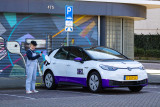
Deelscooteraanbieder Check biedt vanaf vandaag ook deelauto’s aan. Het bedrijf begint met een pilot met 10 deelauto’s in Amsterdam en wil bij succes snel doorgroeien. Door het toevoegen van deelauto’s faciliteert het bedrijf vanaf heden ook reizen buiten de hoofdstad. Check is actief in 20 steden in Nederland en Duitsland.
Bewuste keuze voor Amsterdam
Check kiest er bewust voor om te starten met een pilot in Amsterdam. Amsterdam is één van de eerste steden waar het bedrijf actief werd met deelscooters in september 2020. De gemeente signaleert dat de overstap naar deelmobiliteit hard nodig is. “Er komen steeds meer mensen in Amsterdam wonen en als we allemaal onze eigen auto hebben past het gewoon niet”, aldus Jeroen Schutter, programmamanager deelmobiliteit bij de gemeente Amsterdam.
Data van Check laat zien dat de adoptie van deelscooters in Amsterdam zeer goed is: 105.000 inwoners van de hoofdstad hebben een account bij Check. Een deelscooter vervoert gemiddeld 11 mensen per dag. Bijna 1 op de 10 ritten begint- of eindigt in de regio.
Een antwoord op elke mobiliteitsbehoefte
De missie van Check is het creëren van leefbare steden door onnodig autobezit en -gebruik terug te dringen. De deelauto sluit hier naadloos bij aan, vertelt mede-oprichter en managing director Paul van Merrienboer: “We zien dat onze deelscooters een sterk alternatief bieden voor de autorit binnen Amsterdam. Als een gebruiker een afspraak heeft ver buiten Amsterdam, of naar de bouwmarkt moet, biedt de deelscooter echter niet altijd uitkomst. Door deelauto’s toe te voegen hebben we ook een antwoord op die mobiliteitsbehoefte. Een eigen auto is nu écht niet meer nodig.”
Een simpele propositie
Check gaat van start met 10 volledig elektrische Volkswagen ID3’s. Er bevindt zich een laadpas in elke auto zodat de gebruiker zelf kan (snel)laden bij een laag accupercentage. De voorwaarden om van een auto gebruik te kunnen maken zijn hetzelfde als bij een scooter: gebruikers moeten 18 jaar of ouder zijn en een geldig autorijbewijs hebben. De meer dan 100.000 Amsterdamse gebruikers die momenteel al een account hebben bij Check kunnen dus direct de deelauto in. De auto’s kunnen worden geboekt in de app op het moment dat de gebruiker de auto nodig heeft. Na het boeken heeft de gebruiker 30 minuten om naar de auto toe te gaan en de rit te starten. Net als bij een scooter betaalt een gebruiker pas vanaf het moment dat de rit is gestart en alleen voor het daadwerkelijke gebruik: een starttarief voor een rit met een deelauto is 2 euro, het gebruik per minuut kost 30 cent en pauzeren kost 15 cent per minuut. Er komen achteraf geen kilometerkosten bij.
Een deelauto per zone
De auto’s worden per zone aangeboden: zonefloating. Dat betekent dat een gebruiker aan het einde van de rit de auto binnen een gebied van een paar straten moet parkeren. Amsterdam verwacht dat zonefloating goed werkt qua ruimtebeslag en efficiënt gebruik van laadpalen voor de stad. De zones voor de eerste 10 auto’s bevinden zich in de Pijp en in Amsterdam-Zuid. Op deze manier wil het bedrijf de nieuwe propositie testen in een buurt met een gemiddeld laag autobezit per inwoner (de Pijp) en een buurt met een gemiddeld hoog autobezit per inwoner (Amsterdam-Zuid).
Back to the Future: de Witkar, de eerste elektrische deelauto van Amsterdam
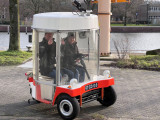
Toen ik als kleine jongen na lang zeuren eindelijk eens op de skelter van de buurjongen mocht rijden, was ik als kind zo blij. Hetzelfde overkwam me, zoveel jaren later nog eens vlak voor het einde van 2022. Door onze Community Manager Sophie was ik geattendeerd op een klein berichtje van NEMO de Studio, een soort dependance van NEMO met een eigen tentoonstelling ('energy junkies') op het Marineterrein. Praktisch buren van Amsterdam Smart City, waar ik sinds halverwege 2022 anderhalve dag per week werk op het thema mobiliteit.
NEMO de Studio ging rijden met de Witkar en je mocht mee, tenminste, als je de 'prijs' won. Daarvoor hoefde je alleen een mailtje te sturen. Nu ben ik dol op prijzen waar ik nagenoeg niets voor hoef te doen, dus dat mailtje was zo gestuurd. En tot mijn verbazing bleek ik gewonnen te hebben. Dus daar ging ik, op 29 december, naar NEMO de Studio.
Natuurlijk had ik Sophie en Pelle (mijn compagnon op het thema mobiliteit) meegevraagd en gedrieën werden we ontvangen door Jodie en Maaike van NEMO. De Witkar was aan het opladen, gewoon met een stekker in het stopcontact. Een driewieler die inderdaad grotendeels wit is, met een mooie rode bies aan de onderkant, en in de verte iets wegheeft van de Pausmobiel. Hoog en rondom ramen. Vanwege de mooie ronde koplampen doet het denken aan Brum, het oldtimer autootje met de ronde koplampen als ogen.
De Witkar reed tussen 1974 en 1986 rond in de stad. Het is feitelijk de eerste elektrische deelauto in Amsterdam. De bedenker ervan, Luud Schimmelpennink, is ook bekend van het Witte Fietsenplan. In totaal zijn er 38 Witkarren gemaakt waarvan er zo'n 25 daadwerkelijk hebben rondgereden. De autootjes stonden in speciaal gebouwde laadstations en konden door leden tegen een vergoeding gebruikt worden. Het was een non-profit initiatief; de opbrengsten werden beheerd door een stichting en werd geïnvesteerd in beheer en uitbreiding van het systeem. Hoeveel mensen er daadwerkelijk gebruik van hebben gemaakt is mij niet bekend.
En nu mocht ik het dus ook proberen. Zelf sturen zat er helaas niet in, maar meerijden is ook al een belevenis. De 'handrem' werd weggenomen, gewoon een stuk blok dat achter de wielen wordt gelegd (een echte handrem was kennelijk niet nodig). Na plaatsgenomen te hebben in de ovale coupé op het Gispen (jawel!) stoeltje naast Jodie die voor deze gelegenheid ook chauffeur was, kon het avontuur beginnen. Voor de gelegenheid hadden de dames een jaren 70 Spotify lijstje opgezet op een JBL- speakertje die achter de stoelen was gelegd (ruimte genoeg). Oude en nieuwe technologie die naadloos samengaan.
Nog even de gordel aan en hup het gaspedaal werd ingedrukt. Soepel accelereerde het karretje naar zo'n 15 km per uur. Het maximum ligt op 30 km/u maar het Marineterrein leent zich daar niet echt voor. Het ritje was niet heel comfortabel, door het gebrek aan schokdempers voel je elk hobbeltje. En door de vele kieren hebben wind en regen vrij spel. De Witkar zou in deze tijd ook ongetwijfeld worden afgekeurd voor gebruik op de openbare weg. Maar net als op de skelter destijds, heb ik ontzettend genoten. Wat een heerlijke ervaring! Comfort en gemak zijn hier niet het belangrijkste. Net zoals bij bijv. kamperen zijn andere zaken veel interessanter dan het comfort van een huisje of hotel. Plezier, authenticiteit, vrijheid, verbinding, avontuur, weg uit de hokjes, verzin het maar: de Witkar biedt het. Een mooie uitvinding van een visionaire man die zijn tijd duidelijk ver vooruit was. Dus, mag ik ajb nog een keer? Mijn buurjongetje destijds verhuisde vrij snel. Maar hopen dat deze buren lang op het Marineterrein blijven!
New Smart Energy Community Event scheduled on October 11: in-person meetup.

Join our speed date and engage with 3 great speakers at the first in-person Smart Energy Community meetup on October 11th!
Topics Smart Energy Community October 11:
Home Energy Management Systems in practice
Now that we are installing more and more heat pumps and EV chargers in homes, there is more and more need for energy management. How does this work? How to deal with cyber security and what role do protocols play? ElaadNL developed its own showcase house where this is put into practice. Arjan Wargers of Flexiblepower Alliance Network & ElaadNL discusses the lessons learned.
Power pitch ATEPS: Energy and storage
ATEPS develops, builds and supplies systems based on batteries that store energy. Jos Theuns (ATEPS) explains how they make storage of sustainable energy accessible, safe and attractive through smarter management of electrical energy. Due to the modular construction of ATEPS systems, they are suitable for both small and larger customers.
Power pitch withthegrid: Teleport
How do you connect PV, wind, battery, EV chargers and heat pumps without losing your mind in all protocols and without cloud lock-in? Paul Mignot (Withthegrid) discusses their new innovation Teleport. This gives customers maximum insights and control over their assets in minutes.
Speed dating, networking & visit demonstration house
In the second half, connecting with other professionals is central. During these speed dating sessions, you will get to know fellow innovators, share project ideas and explore opportunities for collaboration. There will be ample opportunity for discussion after the meeting. At the same time, you can take a tour of ElaadNL's new demonstration home for smart energy services, where various smart devices are optimised for home energy management.
E-bikes draadloos laden op een oplaadtegel, nu bij MOBIHUB Ijsbaanpad in Amsterdam

De trend van het elektrisch fietsen brengt wonderlijke innovaties met zich mee. Van onzichtbare accu’s tot usb-poorten en Spotify op je fietsdisplay. Het laadproces van de e-bike blijft hierin niet achter met de nieuwste innovatie van TILER: draadloos opladen via een stoeptegel. Een product dat naadloos toe te passen is in de MOBIHUBS van MOBIAN: een nieuwe samenwerking is geboren.
TILER heeft de handeling om e-bikes te laden eigenlijk volledig weggenomen. Parkeren is laden en er hoeft verder niks voor gedaan te worden. Het enige wat hiervoor nodig is, is een Laadtegel en de standaard van de fiets moet vervangen worden door TILERs Laadstandaard. Dit is ideaal voor onbeheerde deelfietsvloten, hier wordt het laden nog wel eens vergeten door de gebruiker en zijn standaard laders erg fragiel en niet gemaakt voor dergelijk intensief gebruik.
‘Een te gekke, nieuwe en toegankelijke manier om de e-bike op te laden’, aldus Sven Snel, oprichter van MOBIAN. ‘De trend van de e-bike is ons de laatste jaren niet ontgaan, maar om op onze MOBIHUBS elektrische deelfietsen op een goede manier aan te kunnen bieden blijkt een behoorlijke uitdaging. We hebben ons eerder aan e-bikes gewaagd, maar stuitten te vaak op vernieling van onze laadproducten. In TILER zien we een toffe huterproof-oplossing en gaan dus graag samen de uitdaging om opnieuw e-bikes toe te voegen aan de deelmobiliteiten op onze MOBIHUBS.’
MOBIAN is niet de eerste die samenwerkt met TILER, ook met andere deelfiets concepten is TILER al actief. Voorbeelden zijn huurfietsen bij hotels en pool e-bikes voor personeel. Ook zijn ze onlangs een project gestart met een deelfiets hub bij Arnhem Centraal. ‘Wij zijn erg enthousiast om dit project met MOBIAN te starten, MOBIAN past perfect in deze doelgroep, ook vooral omdat zij zelf hebben ondervonden dat er een laadoplossing moet zijn als je in autonome hubs e-bikes aan wilt bieden. TILER’s visie is om steden te veranderen, meer gericht op mens en natuur - MOBIAN’s park & ride concept past daar natuurlijk perfect in. Auto buiten de stad en binnen de stad verder op licht elektrisch vervoer.’ aldus Christiaan van Nispen, oprichter van TILER.
Vanaf deze week kunnen er e-bikes gehuurd worden bij de MOBIHUB Ijsbaanpad en later deze maand ook bij MOBIHUB Amsterdam West. Wanneer het project succesvol verloopt hopen de bedrijven verder uit te kunnen rollen in de verschillende Nederlandse steden.
Recap of Demo Days #16 – Mobility meets Energy
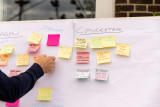
For the sixteenth edition of our Demo Days, we were finally able to meet offline again since the start of the pandemic. This meant: old-school post-its instead of filling online Miro boards. The Mobility & Energy Demo Day was hosted at one of our partners’ locations, namely Commandant’s Residence at the Marineterrein. From CO2 neutral transport to the Johan Cruijff ArenA to city logistics in the university quarter, in this article you’ll read all about mobility & energy projects our partners are working on.
About our Demo Days
The Demo Days are one of the tools we use to stimulate innovation and encourage connection between our partners and community. The purpose of the Demo Days is to present the progress of various innovation projects, ask for help, share dilemmas and involve more partners to take these projects to the next level. More information about the Demo Days can be found here.
Demo Day: Mobility & Energy
CO2 neutral transport to the Johan Cruijff ArenA in 2023 - Boen Groothof and Susanne van Gelder (municipality of Amsterdam)
How can we make CO2 neutral transport to any event in the Johan Cruijff ArenA possible by 2030? This is what the participants of the Mobility Challenge want to figure out. The participants voiced what their organisation wants to contribute to the challenge, and also expressed what they expect from each other. The next step is for all the parties to internally concretize their role within the challenge even further, to make CO2 neutral travelling to events in the Johan Cruijff ArenA possibly by 2030.
A sustainable energy system for business park De Vaart – Anke Delfos (municipality of Almere)
How to make the energy system of business park de Vaart in Almere more sustainable? This was the central question of the work session led by Anke Delfos. The participants concluded that a start could be made with the 'coalition of the willing' and identifying the front runners. The companies that are already enthusiastic can form a vanguard that can actively think along in the new developments. An analysis can be made of the measures that the companies are willing to take individually or collectively. This may lead to collaborations between organizations. The municipality will then also gain insight into which solutions will actually help to generate more energy and meet the increasing demand for energy. In a later phase, the vanguard can also inspire and motivate other companies to take action.
Measuring objectives for urban mobility - Susanne Balm (Amsterdam University of Applied Sciences), Marcel Ludeman (municipality of Amsterdam), Lisa van Velzen (Delft University of Technology)
The municipality of Amsterdam, Facility Services UvA-HvA and the HvA Lectureship City Logistics are working on a logistics research in the University Quarter of Amsterdam. This area is located in the city centre and is used by many stakeholders such as inhabitants, students, and visitors. The goal of the study is to design and evaluate logistical concepts for the University Quarter that are consistent with the objectives for liveability, accessibility and safety of this area. The question for the group: How can these objectives be operationalized and measured? The participants talked about the subjectivity of the objectives and how you can measure certain objectives, but also came up with concrete solutions. For example, providing information to stakeholders for more understanding and recognitions. One of the participants suggested a role-play to evaluate different solutions for smooth logistics in the area.
Want to join the next Demo Day?
Are you working on an innovative project that could use some input? Or are you preparing for an inspiring event that needs a spotlight? Our next Demo Day takes place on the 11th of October. If it fits within our themes (circular, mobility, energy and digital), sent a message to Sophie via sophie@amsterdamsmartcity.com or let us know in the comments. We are happy to talk with you to find out if it's a match!
Would you like to participate in the next Demo Day and share your thoughts on our partners’ innovative projects? As soon as the program for the next Demo Day is determined, we will share it on the platform and give you the opportunity to join as participant.
Curious to circular & digital projects? Read more about it in the recap of Demo Day Circular & Digital.
Photo: Myrthe Polman
Amsterdam Smart City tekent: samen maken we CO2 neutraal reizen naar evenementen de norm
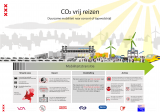
Het klimaat verandert en het wordt steeds drukker in Amsterdam. Jaarlijks komen er alleen al miljoenen bezoekers op Zuidoost af voor het grootste entertainment gebied van Nederland. We staan voor de opgave om de stad, waaronder Zuidoost, leefbaar, veilig en tegelijkertijd bereikbaar te houden. Verschillende partners slaan daarom nu de handen ineen om bezoekers van en naar evenementen in 2023 CO2 neutraal te laten reizen
De auto is op dit moment het meest gebruikte vervoersmiddel in Zuidoost. Amsterdam heeft ervoor gekozen om de privé auto minder ruimte te geven in de stad en de uitstoot van fossiele brandstof terug te dringen om de luchtkwaliteit in de stad te verbeteren en bij te dragen aan de klimaatdoelstellingen.
De transitie van mobiliteit vraagt om een samenwerking tussen (semi) publieke en private partijen en het verstevigen van duurzame alternatieven voor de privé auto. Op 11 mei hebben de gemeente Amsterdam, Johan Cruijff ArenA, Ajax, NS, GVB, Transdev, VRA en Amsterdam Smart City getekend voor een samenwerking rondom CO2 neutraal reizen. Het doel: in 2023 bezoekers CO2 neutraal te laten reizen van en naar één of meerdere evenementen in de Johan Cruijff ArenA. Zodat we samen leren hoe we CO2 neutraal reizen naar evenementen de norm maken
Op de Amsterdam Smart City Demodag op 14 juni zullen de bovenstaande organisaties bij elkaar komen in één van de werksessies, om verder na te denken over het proces. Wat hebben we nodig? Wat wordt de werkwijze? Wat kunnen de grootste hobbels zijn?
Ben je werkzaam bij één van onze partnerorganisaties en lijkt het je interessant om hierover mee te denken? Stuur een mail naar trisha@amsterdamsmartcity.com voor verdere informatie over deelname aan de werksessie.
Amsterdam Smart City Demo Days #16: Open for Applications
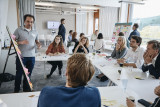
On June 14 and 21 the 16th edition of our Demo Days will take place. This will be the first Demo Days on location (will be announced soon) since COVID-19. Our themes for these upcoming Demo Days are:
14 June: Energy & Mobility
21 June: Circular & Digital
What are the Amsterdam Smart City Demo Days?
The Demo Days are one of the tools we use to stimulate innovation and encourage connection between our partners and community. The purpose of the Demo Days is to present the progress of various innovation projects to each other, ask for help, share dilemmas and involve more partners in a project to take these projects to the next level. In small groups we work on concrete questions.
We have created the Demo Days as a safe place for asking input from the network. A fresh perspective from another professional can be exactly what you need to move forward. You cannot work on a transition alone, which is why it’s important to involve others in your process. During these days, we also give the stage to community members to pitch projects and ask for input from our network.
That’s where you come in!
Not only are the Demo Days open for our community, but we offer you the opportunity to pitch your innovative initiative during the event. We want to involve our community more in the activities that we regularly organise, as you are an important part of the Amsterdam Smart City innovation ecosystem.
Are you working on an innovative project that could use some input? Or are you preparing for an inspiring event that needs a spotlight?
If it fits within our themes, sent a message to sophie@amsterdamsmartcity.com or let us know in the comments. We would be happy to discuss if it's a match!
Recap of Demo Days #15

The first Demo Days of 2022 were a success! On March 10 and 17, we gathered online to connect and inspire our partners and community on the topics Circular & Energy and Digital & Mobility. In this article, we share a recap of the topics and projects discussed during the 15th edition of our Demo Days.
About our Demo Days
The Demo Days are one of the tools we use to stimulate innovation and encourage connection between our partners and community. The purpose of the Demo Days is to present the progress of various innovation projects, ask for help, share dilemmas and involve more partners to take these projects to the next level. More information about the Demo Days can be found here.
Demo Day: Circular & Energy
Circular energy transition
With the changing global economy and shortages of raw materials, it is important to look at materials needed for the energy transition. How can we reduce the negative impact of products that have a positive impact on the energy transition? In this session, participants identified common challenges: think of regulations and logistics, but also behaviour. In addition, one of the conclusions is that education must join the transition. Now that the obstacles are clear, we must reach a joint approach. Do you want to be involved in our next steps? Contact francien@amsterdamsmartcity.com.
The social side of smart grids – Mark van der Wees (Amsterdam University of Applied Sciences) and Lennart Zwols (municipality of Amsterdam)
During the session led by Mark van der Wees and Lennart Zwols, participants discussed the social side of smart grids. Where does the ownership of a smart grid lie? And how can we involve citizens? The main take-out is that we need more knowledge about the broader societal costs, benefits and risks. Questions and input on the societal input of smart grids can be sent to Mark at: m.t.van.wees@hva.nl.
Power in the energy transition – Gijs Diercks (DRIFT)
Gijs Diercks facilitated a session in which we discussed a socio-political aspect of energy transition: namely, how unequal power limits change and reform. Gijs invited participants to discuss their experiences with power relations in energy projects. We often talk about a decentralization of power, but, power often ends up somewhere else. An interesting insight was that it would be good to talk more explicitly about power within concrete projects in the future.
Demo Day: Digital & Mobility
Webinar data management in practice - Arjan Koning (Amsterdam University of Applied Sciences) and Huib Pasman (Johan Cruijff ArenA)
Prior to the sessions, Arjan Koning and Huib Pasman gave a webinar on data management in practice. What do you need to consider when working with data? And what do you need to arrange in order to properly deal with ownership and authorization of access?
The ownership and responsibility of data – Noor Bouwens (Province of North Holland)
Following the webinar, Noor Bouwens led a working session in which the participants were introduced to the developments, tasks and challenges that the Province of North Holland sees in this area. It turned out that challenges in the field of data governance are recognizable to the businesses, knowledge institutions and governments alike. The biggest challenge is the substantive management of project data and deciding who is responsible for this.
The smart charging square – Peter van Dam (SlimLaden)
In this session, the participants reflected on what the future of parking will look like based on the smart charging square case in Haarlemmermeer. The main take-out from the session is that a broader framework is needed around electric parking solutions. It is difficult for municipalities to predict the future when it comes to EV charging. Therefore municipalities are hesitant to formulate concrete plans. Hopefully soon, more pilots will be set up to take smart charging solution to the next phase.
Are you joining us?
Our next Demo Days take place on June 14 (Mobility & Energy) and June 21 (Circular & Digital).
Are you working on an innovative project that could use some input? Or are you preparing for an inspiring event that needs a spotlight?
If it fits within our themes, sent a message via trisha@amsterdamsmartcity.com or let us know in the comments. We are happy to talk with you to find out if it's a match! As soon as the program is determined, we will share it on the platform and give you the opportunity to join as participant.
Leonie van den Beuken announced as chairwoman of Vereniging Elektrische Rijders

Leonie van den Beuken, Program Director of Amsterdam Smart City, is announced as the new chairwoman of the Vereniging Elektrische Rijders starting April 1. She will voluntarily fulfill her role as chairwoman in addition to her job as Program Director of Amsterdam Smart City. The Vereniging Elektrische Rijders (VER) represents the electric driver and serves as an independent source of information for (future) electric drivers. The VER increasingly contributes to the debate and implementation of the further electrification of the Netherlands, at national and regional, but also at local level. Leonie will play an important role in this. She considers her new position as a good challenge: ''Electric driving is better for our climate, ensures better livability of cities and villages and is also comfortable. However, electric vehicles are still far from being available to everyone. Building on the fantastic foundation the VER has laid, I am going to make every effort to accelerate the move towards cleaner mobility with a special focus on making it affordable and even more sustainable. For example, through shared mobility and innovating on more sustainable technology''
Leonie succeeds Koos Burgman, who was committed to the VER for the past five years and has helped the organisation grow to where it is today in an outstanding way. The VER has almost 10,000 members, more than 500 volunteers and almost 80 ambassadors and is growing steadily.
For more information about the VER and their mission, visit their website on: https://www.evrijders.nl/
📣 #Rethink #Energy for industry: Join us to co-develop an open source Shared Energy Platform.

📣 #Rethink #Energy: Internet of Energy, Digital Twins, Open Source !
Port of Amsterdam and SEP have joined FLEXCON2022. In anticipation of #FLEXCON2022, they will host a multiple-day Design Sprint: you are invited to join us to #Rethink #Energy for industrial scale!
Join us to co-develop the open source Shared Energy Platform. The kick-off is the webinar on 21 March, 15.30 - 17.00. Register now, and be part of the sustainable energy revolution.
We have set up a program with great speakers to discuss to the efficiency and resilience of energy production and grid systems:
- Arash Aazami (Unify.energy): Internet of Energy
- Wilbert Prinssen (Phase to Phase): Digital Twins
- Nicolas Höning (SEITA - Open software for energy flexibility): Open Source and Smart Energy
- Derek Hardwick (Ampact Consulting): Design Sprint fundamentals
Our hosts:
- Thomas Hermans – Port of Amsterdam
- Robin Schipper – Shared Energy Platform
Please note: the webinar will be in English.
Register here for the kick off on 21 March 15.30 - 17.00: Subscription form.
Amsterdam launches bike safety innovation competition
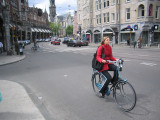
Amsterdam is inviting universities, companies and members of the public to come up with solutions to improve bike safety in the Dutch capital through an open challenge.
The central theme of the competition – “Different speeds on bicycle paths” – aims to influence the behaviour of road users and asks how bike delivery services, and differences in speed bicycle types can impact this.
Applications are open until February 24, with the winner set to be announced on April 11.
Stay up to date
Get notified about new updates, opportunities or events that match your interests.

